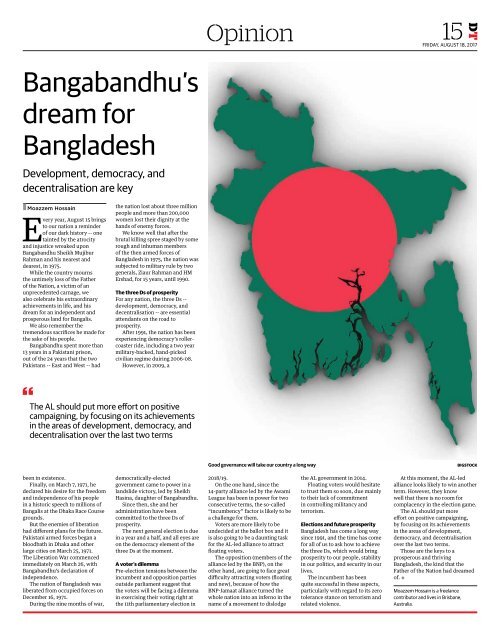e_Paper, Friday, August 18, 2017
You also want an ePaper? Increase the reach of your titles
YUMPU automatically turns print PDFs into web optimized ePapers that Google loves.
Opinion 15<br />
DT<br />
FRIDAY, AUGUST <strong>18</strong>, <strong>2017</strong><br />
Bangabandhu’s<br />
dream for<br />
Bangladesh<br />
Development, democracy, and<br />
decentralisation are key<br />
• Moazzem Hossain<br />
Every year, <strong>August</strong> 15 brings<br />
to our nation a reminder<br />
of our dark history -- one<br />
tainted by the atrocity<br />
and injustice wreaked upon<br />
Bangabandhu Sheikh Mujibur<br />
Rahman and his nearest and<br />
dearest, in 1975.<br />
While the country mourns<br />
the untimely loss of the Father<br />
of the Nation, a victim of an<br />
unprecedented carnage, we<br />
also celebrate his extraordinary<br />
achievements in life, and his<br />
dream for an independent and<br />
prosperous land for Bangalis.<br />
We also remember the<br />
tremendous sacrifices he made for<br />
the sake of his people.<br />
Bangabandhu spent more than<br />
13 years in a Pakistani prison,<br />
out of the 24 years that the two<br />
Pakistans -- East and West -- had<br />
the nation lost about three million<br />
people and more than 200,000<br />
women lost their dignity at the<br />
hands of enemy forces.<br />
We know well that after the<br />
brutal killing spree staged by some<br />
rough and inhuman members<br />
of the then armed forces of<br />
Bangladesh in 1975, the nation was<br />
subjected to military rule by two<br />
generals, Ziaur Rahman and HM<br />
Ershad, for 15 years, until 1990.<br />
The three Ds of prosperity<br />
For any nation, the three Ds --<br />
development, democracy, and<br />
decentralisation -- are essential<br />
attendants on the road to<br />
prosperity.<br />
After 1991, the nation has been<br />
experiencing democracy’s rollercoaster<br />
ride, including a two year<br />
military-backed, hand-picked<br />
civilian regime duiring 2006-08.<br />
However, in 2009, a<br />
The AL should put more effort on positive<br />
campaigning, by focusing on its achievements<br />
in the areas of development, democracy, and<br />
decentralisation over the last two terms<br />
Good governance will take our country a long way<br />
BIGSTOCK<br />
been in existence.<br />
Finally, on March 7, 1971, he<br />
declared his desire for the freedom<br />
and independence of his people<br />
in a historic speech to millions of<br />
Bangalis at the Dhaka Race Course<br />
grounds.<br />
But the enemies of liberation<br />
had different plans for the future.<br />
Pakistani armed forces began a<br />
bloodbath in Dhaka and other<br />
large cities on March 25, 1971.<br />
The Liberation War commenced<br />
immediately on March 26, with<br />
Bangabandhu’s declaration of<br />
independence.<br />
The nation of Bangladesh was<br />
liberated from occupied forces on<br />
December 16, 1971.<br />
During the nine months of war,<br />
democratically-elected<br />
government came to power in a<br />
landslide victory, led by Sheikh<br />
Hasina, daughter of Bangabandhu.<br />
Since then, she and her<br />
administration have been<br />
committed to the three Ds of<br />
prosperity.<br />
The next general election is due<br />
in a year and a half, and all eyes are<br />
on the democracy element of the<br />
three Ds at the moment.<br />
A voter’s dilemma<br />
Pre-election tensions between the<br />
incumbent and opposition parties<br />
outside parliament suggest that<br />
the voters will be facing a dilemma<br />
in exercising their voting right at<br />
the 11th parliamentary election in<br />
20<strong>18</strong>/19.<br />
On the one hand, since the<br />
14-party alliance led by the Awami<br />
League has been in power for two<br />
consecutive terms, the so-called<br />
“incumbency” factor is likely to be<br />
a challenge for them.<br />
Voters are more likely to be<br />
undecided at the ballot box and it<br />
is also going to be a daunting task<br />
for the AL-led alliance to attract<br />
floating voters.<br />
The opposition (members of the<br />
alliance led by the BNP), on the<br />
other hand, are going to face great<br />
difficulty attracting voters (floating<br />
and new), because of how the<br />
BNP-Jamaat alliance turned the<br />
whole nation into an inferno in the<br />
name of a movement to dislodge<br />
the AL government in 2014.<br />
Floating voters would hesitate<br />
to trust them so soon, due mainly<br />
to their lack of commitment<br />
in controlling militancy and<br />
terrorism.<br />
Elections and future prosperity<br />
Bangladesh has come a long way<br />
since 1991, and the time has come<br />
for all of us to ask how to achieve<br />
the three Ds, which would bring<br />
prosperity to our people, stability<br />
in our politics, and security in our<br />
lives.<br />
The incumbent has been<br />
quite successful in these aspects,<br />
particularly with regard to its zero<br />
tolerance stance on terrorism and<br />
related violence.<br />
At this moment, the AL-led<br />
alliance looks likely to win another<br />
term. However, they know<br />
well that there is no room for<br />
complacency in the election game.<br />
The AL should put more<br />
effort on positive campaigning,<br />
by focusing on its achievements<br />
in the areas of development,<br />
democracy, and decentralisation<br />
over the last two terms.<br />
Those are the keys to a<br />
prosperous and thriving<br />
Bangladesh, the kind that the<br />
Father of the Nation had dreamed<br />
of. •<br />
Moazzem Hossain is a freelance<br />
contributor and lives in Brisbane,<br />
Australia.


















